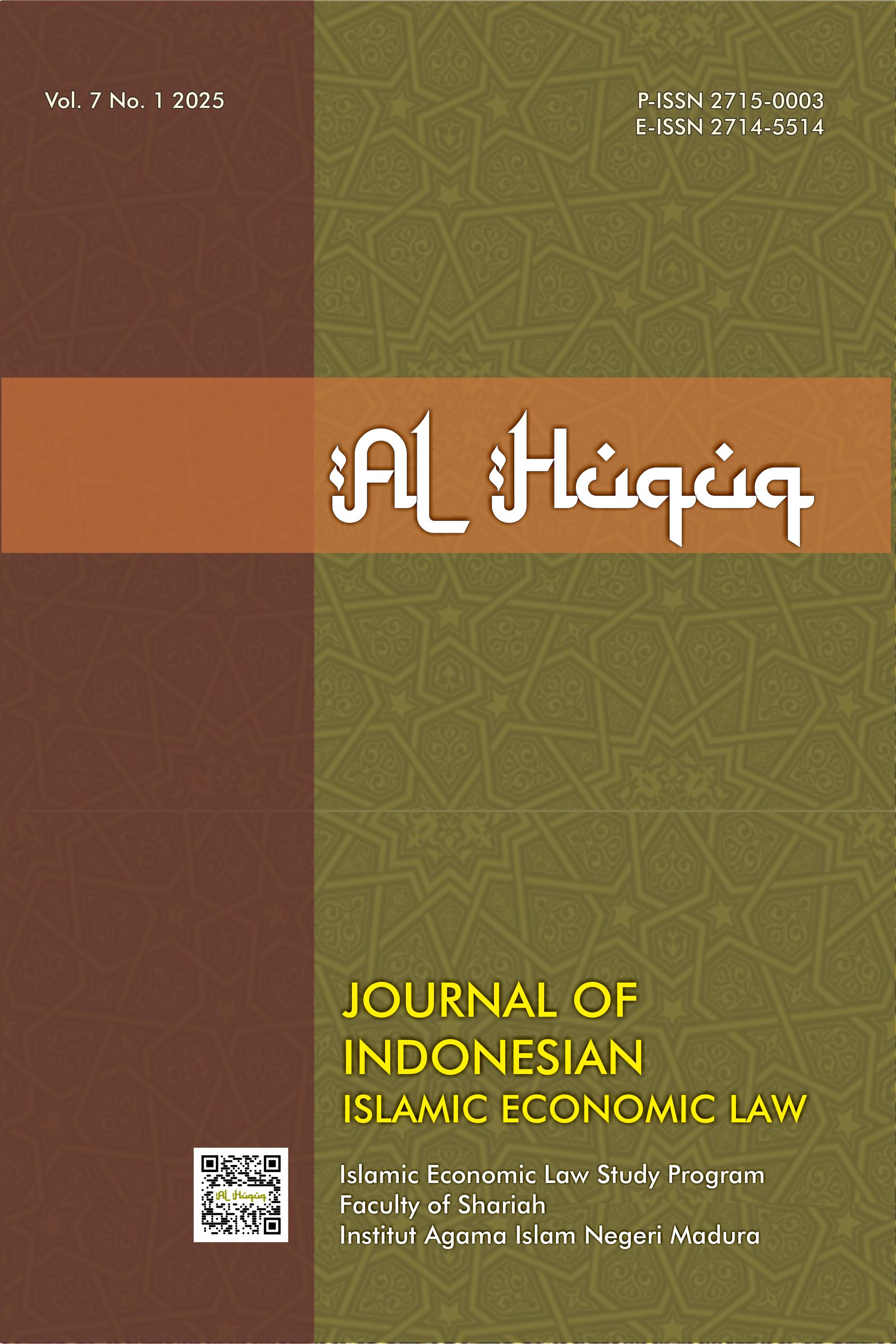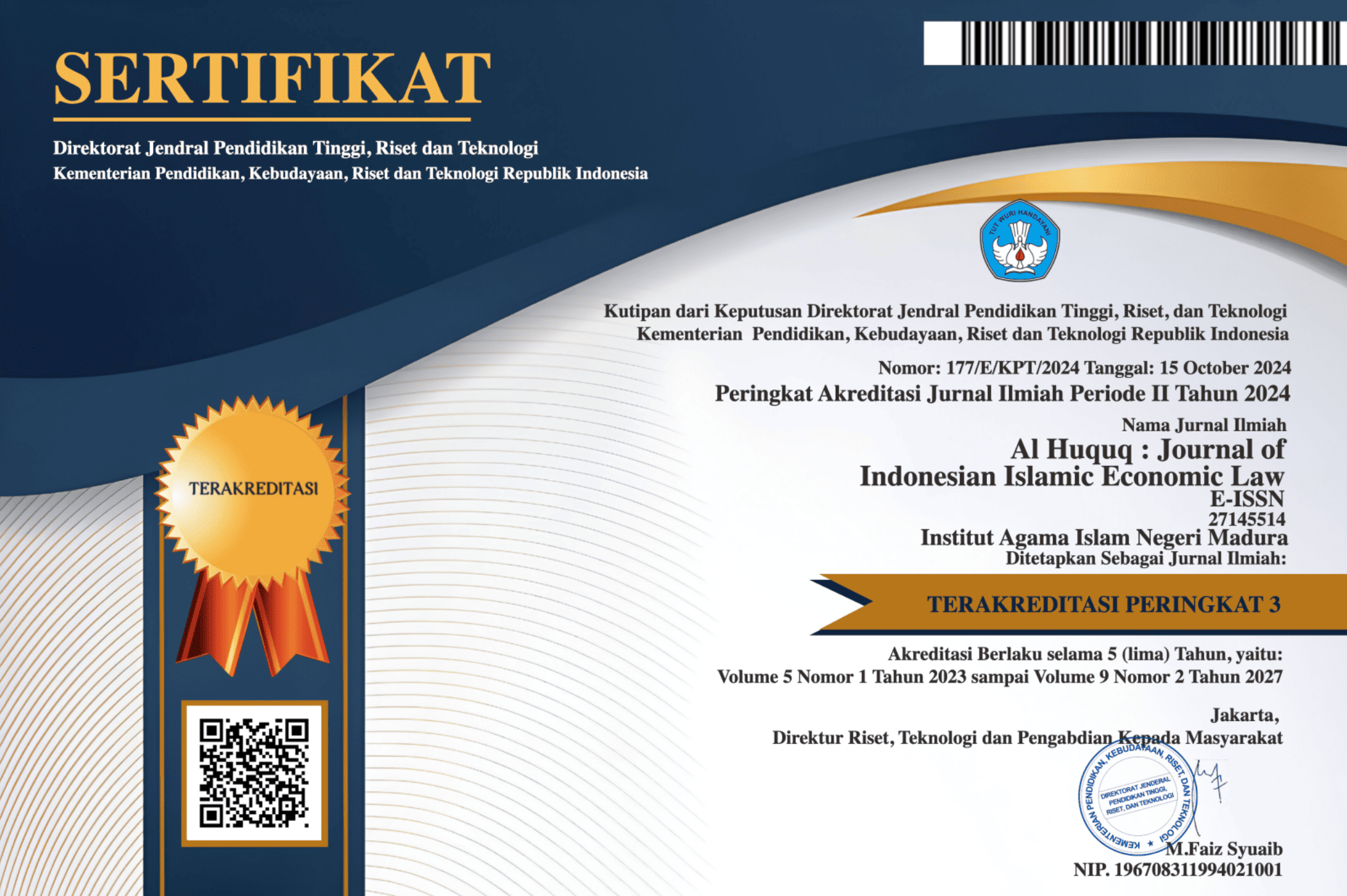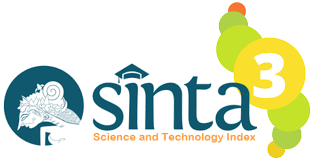Legitimasi Etis Maqashid Syariah atas Penggunaan Artificial Intellegencia Sebagai Algoritma Penyelesaian Sengketa Konsumen Berbasis Hybrid Online Dispute Resolution
 Abstract views: 577
,
Abstract views: 577
,
 PDF downloads: 280
PDF downloads: 280
Abstract
Penelitian ini membahas peluang penggunaan kecerdasan buatan (AI) dalam penyelesaian sengketa konsumen melalui sistem Hybrid Online Dispute Resolution (ODR Hibrida) dan legitimasi etis maqashid syariah terhadapnya. Penelitian ini merupakan penelitian hukum doktrinal dengan pendekatan konsptual dan perundang-undangan. Bahan hukum yang digunakan adalah bahan hukum primer, sekunder dan tersier yang dikumpulkan melalui studi kepustakaan dan internet searching yang selanjutnya dianalisis secara preskriptif kualitatif. Penelitian ini menemukan bahwa AI mampu mengatasi permasalahan internal di Badan Penyelesaian Sengketa Konsumen (BPSK). Permasalahan tersebut seperti masalah pada tingkat profesionalisme para anggota yang rendah dan tingkat kegagalan penyelesaian sengketa konsumen yang tinggi. AI dapat digunakan dalam ODR Hibrida untuk sengketa sederhana, repetitif dengan nilai kerugian di bawah Rp. 500.000.000,- akibat wanprestasi atau perbuatan melawan hukum yang dilakukan oleh pelaku usaha Prinsip-prinsip Maqashid Syariah mendukung penggunaan AI, yang dapat memastikan keadilan dan transparansi. Dengan begitu, penggunaan AI dalam ODR Hibrida dibenarkan secara teknis, hukum, dan etis menurut syariah, serta meningkatkan akses keadilan dan perlindungan konsumen. (This research discusses the opportunity to use artificial intelligence (AI) in consumer dispute resolution through the Hybrid Online Dispute Resolution (ODR Hybrid) system and the ethical legitimacy of maqashid syariah to it. This research is a doctrinal legal research with conceptual and statutory approaches. The legal materials used are primary, secondary and tertiary legal materials collected through literature study and internet searching which are then analysed prescriptively qualitative. This research found that AI is able to overcome internal problems in the Consumer Dispute Resolution Agency (BPSK). These problems include the low level of professionalism of the members and the high failure rate of consumer dispute resolution. AI can be used in Hybrid ODR for simple, repetitive disputes with a loss value below Rp. 500,000,000,- due to default or unlawful acts committed by business actors Maqashid Syariah principles support the use of AI, which can ensure fairness and transparency. As such, the use of AI in Hybrid ODR is technically, legally, and ethically justified under Shariah, and enhances access to justice and consumer protection.)
Downloads
References
Achmad Ali. Menguak Teori Hukum (Legal Theory) Dan Teori Peradilan (Judicialprudence) Termasuk Interpretasi Undang-Undang (Legisprudence). Cetakan V. Jakarta: Penerbit Kencana Prenada Group, 2013.
Agus, Agus, Sudirman Sudirman, Wahyudi Umar, and Ahmad Rustan. “The Use of Artificial Intelligence in Dispute Resolution Through Arbitration: The Potential and Challenges.” Sasi 29, no. 3 (2023): 570. https://doi.org/10.47268/sasi.v29i3.1393.
Amir Syarifudin. Pengertian Dan Sumber Hukum Islam. Jakarta: Bumi Aksara, 2008.
Amiruddin dan Zainal Asikin. Pengantar Penelitian Hukum. Jakarta: Rajawali Press, 2018.
Anugroho, Adhi, Ratih Lestarini, and Tri Hayati. “Analisis Yuridis Terhadap Asas Efisiensi Berkeadilan Berdasarkan Pasal 33 Ayat (4) UUD 1945 Dalam Peraturan Perundang-Undangan Di Bidang Ketenagalistrikan.” Jurnal Hukum & Pembangunan 47, no. 2 (2017): 183. https://doi.org/10.21143/jhp.vol47.no2.1451.
ASEAN Secretariat. Handbook on ASEAN Consumer Protection Laws and Regulations. Jakarta: ASEAN Secretariat, 2021. http://asean.org/storage/2018/05/Handbook-on-ASEAN-Consumer-Protection-Laws-and-Regulation.pdf.
———. Handbook on ASEAN Consumer Protection Laws and Regulations. Second Edi. Jakarta: The ASEAN Secretariat Community Relations Division (CRD), 2021. http://asean.org/storage/2018/05/Handbook-on-ASEAN-Consumer-Protection-Laws-and-Regulation.pdf.
AUDA, JASSER. Maqasid Al-Shariah as Philosophy of Islamic Law A Systems Approach. London Washington: the international institute of islamic thought, 2019. https://doi.org/10.2307/j.ctvkc67tg.8.
Avila Negri, Sergio M.C. “Robot as Legal Person: Electronic Personhood in Robotics and Artificial Intelligence.” Frontiers in Robotics and AI 8, no. December (2021): 1–10. https://doi.org/10.3389/frobt.2021.789327.
Bertolini, Andrea, and Francesca Episcopo. “Robots and AI as Legal Subjects? Disentangling the Ontological and Functional Perspective.” Frontiers in Robotics and AI 9, no. April (2022): 1–15. https://doi.org/10.3389/frobt.2022.842213.
Doomen, Jasper. “The Artificial Intelligence Entity as a Legal Person.” Information and Communications Technology Law 32, no. 3 (2023): 277–87. https://doi.org/10.1080/13600834.2023.2196827.
Filipova, I. A., and V. D. Koroteev. “Future of the Artificial Intelligence: Object of Law or Legal Personality?” Journal of Digital Technologies and Law 1, no. 2 (2023): 359–86. https://doi.org/10.21202/jdtl.2023.15.
GH Kasap. “Can Artificial Intelligence (‘AI’) Replace Human Arbitrators? Technological Concerns and Legal Implications.” Journal of Dispute Resolution 5, no. 2 (2021): 209–53.
Goel, Shivam. “‘Med Arb’: A Novel ADR Approach.” SSRN Electronic Journal, 2016, 1–18. https://doi.org/10.2139/ssrn.2800693.
Izzudin bin ‘Abd al-Salam. Qawa‘id Al-Ahkam Fi Mashalih Al-Anam. Kairo: Dar al-Bayan al-Arabi, 2002.
Jasser Audah. Maqashid Al-Shariah A Beginners Guide. London Washington: tʜe ɪɴteʀɴatɪoɴaʟ ɪɴstɪtute of ɪsʟamɪc tʜouɢʜt, 2014.
Kevin Lee, Drew & Napier LLC. “The Development of the ASEAN Alternative Dispute Resolution (ADR) Guidelines For Consumer Protection.” Australia: the Australian Government through the ASEAN-Australia Development Cooperation Program (AADCP) Phase II, 2021.
Khan, Muhammad Akbar. “Consumer Protection in Islamic Law (Shariah): An Overview.” Al-Adwa 31, no. 45 (2016): 77–100. http://pu.edu.pk/images/journal/szic/PDF/English/6- Muhammad Akbar Khan Final Draft of Research Paper.pdf.
Maimun. “KONSEP SUPREMASI MASLAHAT AL-THUFI DAN IMPLEMENTASINYA DALAM PEMBARUAN PEMIKIRAN HUKUM ISLAM.” Asas 6, no. 1 (2014): 13–33.
Marrow, Paul Bennett, Mansi Karol, and Steven Kuyan. “Artificial Intelligence and Arbitration: The Computer as an Arbitrator-Are We There Yet?” Dispute Resolution Journal 74, no. 4 (2020): 35–76.
Niaga, Direktorat Perlindungan Konsumen dan Tertib. Lampiran Keputusan Direktur Jenderal Perlindungan Konsumen dan Tertib Niaga Kementrian Perdagangan No. 162 Tahun 2020 tentang Rencana Strategis Direktorat Perlindungan Konsumen dan Tertib Niaga 2020-2024 (2020).
Nur Jannani, Noer Yasin and Musataklima. “The Impact of The Liquidation of the Quasi-Judicial Instution of the Consumer Dispute Resolution Boy on Consumer’Access to Justice and Its Reorganisation Efforts From the Perspective of Siyasah Syariah.” Jurisdictie: Jurnal Hukum Dan Syariah 15, no. 1 (2024): 117–48. https://doi.org/DOI: http://dx.doi.org/10.18860/j.v15i1.26564.
Nurpadila, Mutiara, and Devis Siti Hamzah Marpaung. “Online Dispute Resolution (ODR) Sebagai Alternatif Penyelesaian Sengketa E-Commerce Di Indonesia.” Jurnal Ilmiah MEA (Manajemen, Ekonomi, Dan Akuntansi) 5, no. 2 (2021): 463–79.
Pappas, Brian A. “Med-Arb and the Legalization of Alternative Dispute Resolution.” Harvard Negotiation Law Review 20, no. 157 (2015): 157–203. https://heinonline.org/hol-cgi-bin/get_pdf.cgi?handle=hein.journals/haneg20§ion=6.
Peter Mahmud Marzuki. Penelitian Hukum. Jakarta: Prenada Media Group, 2010.
Rifkin, Ethan Katsh and Janet. Online Dispute Resolution: Resolving Conflicts in Cyberspace. San Fransisco: Jossey Bass, 2001.
Sang, Jianing. “Internet Court on Solving Online Consumer Contract Disputes : Case of China.” Digital Law Journal 2, no. 3 (2021): 23–45.
Shi, Changqing, Tania Sourdin, and Bin Li. “The Smart Court – A New Pathway to Justice in China?” International Journal for Court Administration 12, no. 1 (2021): 1–19. https://doi.org/10.36745/ijca.367.
Shidarta. Ilmu-Ilmu Empiris Tentang Hukum: Penerapannya Pada Kajian Sosio-Legal. Jakarta: Kencana, 2024.
Soerjono Soekanto. Penegakan Hukum. Bandung: Bina Cipta, 1983.
Solhchi, Mohammad, and Faraz Baghbanno. “Artificial Intelligence and Its Role in the Development of the Future of Arbitration.” International Journal of Law in Changing World 2, no. 2 (2023): 56–76. https://doi.org/10.54934/ijlcw.v2i2.56.
Sourdin, Tania. Judges, Technology and Artificial Intelligence: The Artificial Judge. Edited by Peter K Yu. Judges, Technology and Artificial Intelligence: The Artificial Judge. United Kingdom: Edward Elgar Publishing Limited, 2021. https://doi.org/10.4337/9781788978262.
Sourdin, Tania, and Bin Li. “Humans and Justice Machines: Emergent Legal Technologies and Justice Apps.” SSRN Electronic Journal 156, no. February (2020). https://doi.org/10.2139/ssrn.3662091.
Syamsuddin, M. Mahir Meneliti Permasalahn Hukum. Jakarta: Prenada Media Group, 2021.
Tania Sourdin, Bin Li and Tom Hinds. “HUMANS AND JUSTICE MACHINES: EMERGENT LEGAL TECHNOLOGIES AND JUSTICE APPS.” Jm 4, no. April (2012): 1–55.
Wen, Zhifeng, and Deyi Tong. “Analysis of the Legal Subject Status of Artificial Intelligence.” Beijing Law Review 14, no. 01 (2023): 74–86. https://doi.org/10.4236/blr.2023.141004.
Wignjosoebroto, Soetandyo. Hukum: Paradigma, Metode, Dan Masalahnya. Edited by Ifdhal Kasim (Editor Utama), Winarno Yudho, Sandra Moniaga, Noer Fauzi, Ricardo Simarmata, and Eddie Sius RL. Jakarta: Elsam dan Huma, 2002.
Yasid, Amer Fawwaz Mohammad. “Journal of International Studies Journal of International Studies.” Journal of International Studies 19, no. 2 (2023): 1–23.
Yijia Lu. “Med-Arb and Arb-Med: A Law and Economic Analysis.” Harvard Negotiation Law Review 27, no. 2 (2022).
Copyright (c) 2025 Al-Huquq: Journal of Indonesian Islamic Economic Law

This work is licensed under a Creative Commons Attribution-ShareAlike 4.0 International License.















